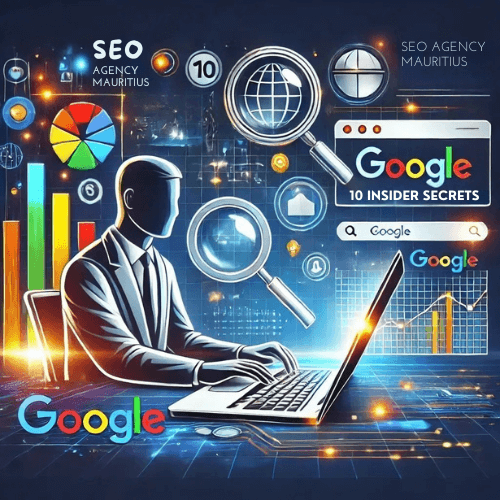
Digital Marketing in Mauritius: Trends and Strategies for 2025
Introduction: The Evolution of Digital Marketing in Mauritius Mauritius is no longer just a paradise island—it’s a growing digital economy where businesses must adapt to

You’ve just launched your new business, and like many entrepreneurs, you’re excitedly promoting it on social media. You’ve boosted a few posts, gained some followers, and are starting to see likes and comments roll in. But here’s the catch—what if all that engagement isn’t translating into sales? In fact, relying solely on social media for your marketing efforts might be a trap that keeps your business from achieving real growth.
While social media can help build brand awareness, it’s not always the best strategy for generating immediate sales, which are crucial for a small business’s survival. Instead, focusing on lead generation might be the key to turning your hard work into real revenue. Let’s dive into why leads are more important than just traffic and awareness and how you can avoid the social media trap.

Small businesses typically operate with limited budgets and resources, making it essential to prioritize strategies that deliver immediate, tangible results. While building brand awareness is important, it can be a long-term play that doesn’t always align with the immediate needs of a new or growing business.
Small businesses often need to generate revenue quickly to sustain operations and fund further growth. This is where lead generation becomes a critical focus. Unlike broader awareness campaigns, lead generation targets individuals who are already interested in your product or service, increasing the likelihood of conversion and revenue generation.
The Limitations of Traffic and Awareness Campaigns
Many small business owners start their digital marketing efforts by running ads on platforms like Facebook and Instagram, believing that these channels will quickly build their brand and drive sales. However, while social media can be effective for building awareness, it often falls short when it comes to converting that awareness into immediate sales.
Social media users are typically in a passive browsing mode. They might engage with your content by liking a post or following your page, but that doesn’t necessarily mean they’re ready to make a purchase. For a small business that needs to see a return on investment quickly, this can be a significant drawback.
Why Lead Generation Should Be Your Focus
To drive immediate sales and grow your customer base, you need to focus on generating high-quality leads—potential customers who have already shown interest in what you offer. This is where tools like Google Ads can be particularly powerful.
When someone searches for a product or service on Google, they are actively looking to make a purchase or solve a problem. By targeting these search queries with Google Ads, you can reach potential customers at the exact moment they are ready to buy. This approach is far more likely to result in conversions than relying solely on social media ads that target passive browsers.
The Difference Between Traffic and Leads
It’s important to distinguish between website traffic and leads. Traffic refers to the number of visitors to your site, but not all visitors are created equal. While high traffic numbers might look impressive, they don’t necessarily translate into sales.
Leads, on the other hand, are visitors who have taken a specific action that indicates interest in your product or service. This could be filling out a contact form, requesting a quote, or signing up for a newsletter. These actions signal that the visitor is considering making a purchase, making them far more valuable than a casual website visitor.
Examples of Effective Lead Generation
Lead generation can take many forms, depending on your industry and target audience:
Real Estate: A real estate agent might generate leads by offering a free home valuation tool on their website. Homeowners who use this tool are likely considering selling their property and are prime candidates for follow-up.
Fitness Trainer: A fitness trainer could generate leads by offering a free consultation. Individuals who take advantage of this offer are actively seeking fitness advice and are more likely to become paying clients.
Focusing on lead generation brings numerous advantages to small businesses, making it a key strategy for success. Leads, by their nature, are individuals who are already interested in your product or service, which means they are much closer to making a purchase. This proximity to conversion makes them more likely to become paying customers, directly contributing to your revenue. Additionally, by tracking the leads you generate and their conversion rates, you can accurately measure the effectiveness of your marketing efforts. This ability to gauge performance not only helps you optimize your campaigns but also ensures a better return on investment.
Leads also play a crucial role in building a loyal customer base. By nurturing these leads, you can turn them into repeat customers who provide long-term value to your business. Moreover, lead generation is often more cost-effective than broader awareness campaigns, helping you acquire new customers efficiently.
Beyond immediate revenue, lead generation provides valuable insights into your target audience. By analyzing lead data, you gain a deeper understanding of customer preferences and behavior, allowing you to refine your marketing strategy. This understanding also gives you a competitive edge in the marketplace, as you can tailor your offerings more precisely to meet the needs of your customers.

A lead is a potential customer who has shown interest in your product or service by taking an action, such as filling out a form, signing up for a newsletter, or requesting a quote. This indicates that they are considering making a purchase and are more likely to convert into a paying customer.
While traffic and awareness are important components of a comprehensive marketing strategy, they are not enough on their own—especially for small businesses that need to see results quickly. Leads are the lifeblood of a business, representing potential customers who are already interested in what you offer.
By focusing on lead generation, you can drive immediate sales, build a loyal customer base, and set your business on a path to sustainable growth. In today’s competitive digital landscape, tools like Google Ads offer the precision and targeting needed to reach the right customers at the right time.
If you need help setting up a lead-focused advertising campaign or want to ensure your digital marketing efforts are delivering the results your business needs, MaxOcean Marketing is here to help. Contact us today to learn more about how we can support your growth.
Stay Ahead with Tips, Trends & Deals

Introduction: The Evolution of Digital Marketing in Mauritius Mauritius is no longer just a paradise island—it’s a growing digital economy where businesses must adapt to

Hi, I’m Armin Schreiber, a passionate SEO strategist and founder of MaxOcean, SEO agency Mauritius, a leading digital marketing agency in Mauritius. With years of
Pre-Stay: Nurturing Leads and Building Trust How Automated Managed Email Marketing Boosts Hotel Sales and Builds Lasting Loyalty In the cutthroat world of hospitality, getting
How Has the Customer Journey Changed? In the ever-changing world of digital marketing, the customer journey has transformed dramatically over the past few years. Gone
Why Relying Solely on Social Media Could Be Holding Your Business Back You’ve just launched your new business, and like many entrepreneurs, you’re excitedly promoting

Building a Powerful High-Converting Law Firm Website Structuring for Success in SEO, Google Ads, and Client Experience Your website is the cornerstone of your law
A lead is a potential customer who has shown interest in your product or service by taking an action, such as filling out a form, signing up for a newsletter, or requesting a quote. This indicates that they are considering making a purchase and are more likely to convert into a paying customer

MaxOcean Marketing
Typically replies within minutes
"Do you have any questions about You’ve Opened Your New Business and Are Promoting It on Social Media, but Be Careful—It Might Be a Trap? How can I assist you today?
Contact Me
🟢 Online | Privacy policy
WhatsApp us
Join the MaxOcean Marketing Insider-Club – Proven Fixes & Perks for Growing Businesses